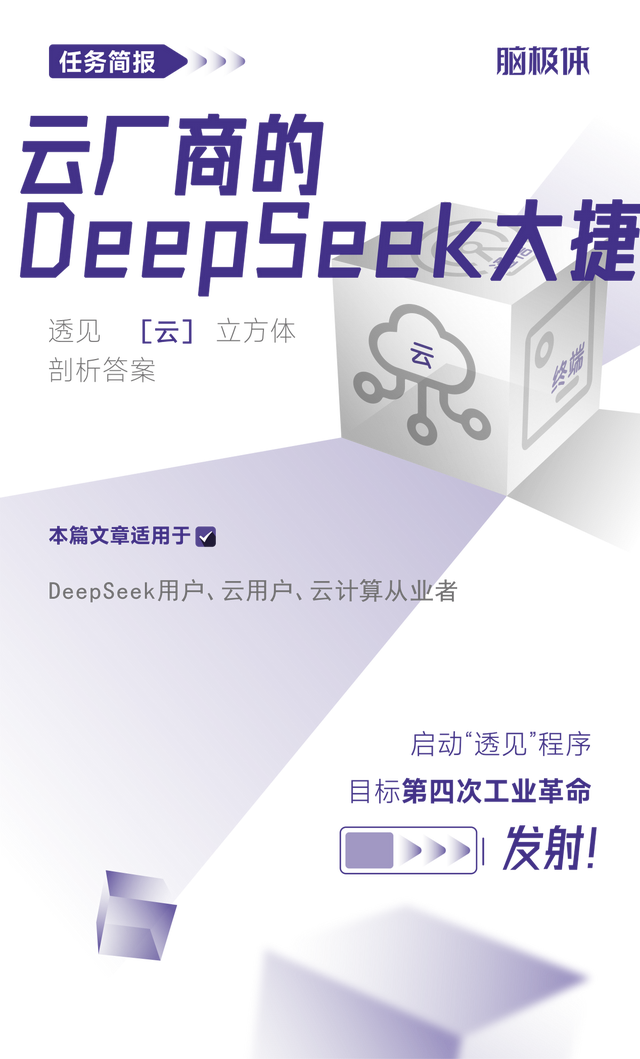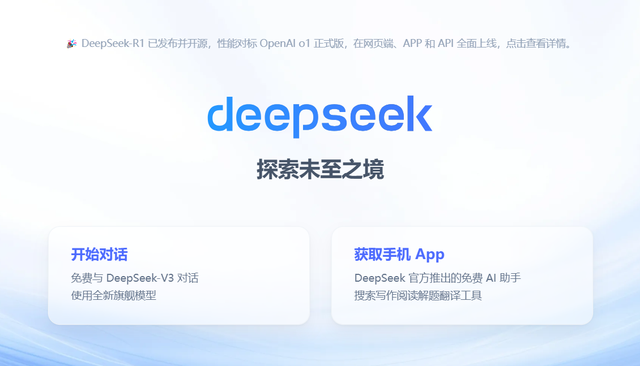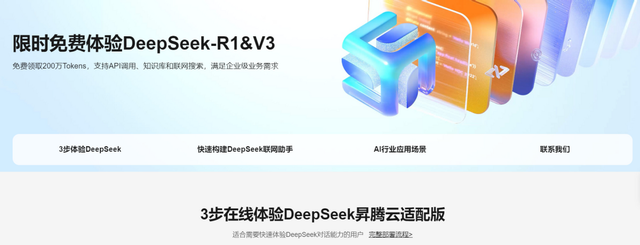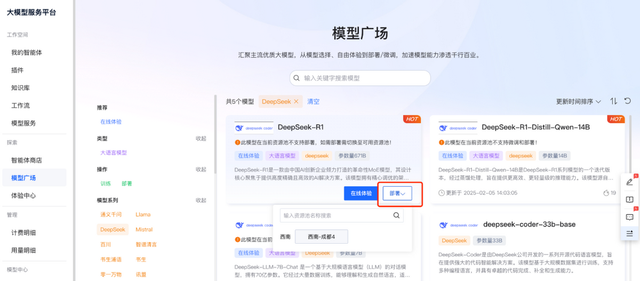Cloud Vendors' Triumph with DeepSeek: A New Dawn in AI Services
![]() 02/11 2025
02/11 2025
![]() 710
710

In recent days, countless users eager to experience DeepSeek were met with the disheartening message, "Server busy, please try again later." This surge in visitors, while challenging, underscores the burgeoning potential of emerging AI services.

Fortunately, post-holiday, a turning point emerged. Almost all mainstream domestic cloud vendors swiftly completed full access to the DeepSeek model. The domestic cloud service market now boasts a formidable trio: internet cloud giants (Alibaba Cloud, Tencent Cloud, Baidu Intelligent Cloud, JD Cloud), AI cloud leaders (Huawei Cloud), and operator clouds (China Telecom Cloud, China Unicom Cloud, China Mobile Cloud). These players are racing to build DeepSeek model services to meet the burgeoning demand.
As "DeepSeek service availability" ceases to be a question, let's delve deeper into the broader implications of this cloud market trendsetter.
The DeepSeek-R1 inference model heralds a new technological evolution for large language models (LLMs), poised to infiltrate personal applications and industrial scenarios. These models not only demand robust computing resources but also necessitate real-time response, efficient resource scheduling, and cost control. This presents a new frontier for cloud vendors to upgrade their capabilities and reshape their business models.
Post-holiday, the rush to access DeepSeek is akin to a strategic Normandy landing for cloud vendors. The battlefield of "DeepSeek cloud applications" is heating up, with vendors intensifying their efforts.
This article explores the impending triumph of DeepSeek in the cloud market.

First, let's address a fundamental question: What is the nexus between DeepSeek and the cloud? Why does cloud deployment smoothen access to DeepSeek?
AI model applications often grapple with resource constraints. During the Spring Festival, DeepSeek-R1 emerged as the world's most followed AI large model due to its superior inference capabilities and cost-effectiveness. However, the surge in visitors exposed the resource limitations of AI startups, leading to service instability. Cloud platforms, with their resource virtualization and elastic scaling capabilities, can support tens of millions of API calls daily, ensuring stable and reliable services for AI applications.
Cloud vendors are poised to capitalize on the DeepSeek opportunity, catering to the enthusiasm for domestic AI across various sectors and harnessing the overwhelming traffic.

DeepSeek's commercial value to cloud vendors encompasses three key aspects:
- Direct Revenue: While many cloud platforms offer free trials for DeepSeek, these are usually time- and quantity-limited. Post-trial, users invoking the DeepSeek API will drive token consumption and subscription payments, directly benefiting the cloud platform.
- Ecosystem Revenue: Developers and enterprises must deploy AI applications based on DeepSeek to reach hundreds of millions of users, and the cloud is indispensable. Model code and cloud services are deeply integrated, ensuring sustained cloud usage for DeepSeek-based AI programs.
- Intelligent Value-Added Services: With the advent of large models, cloud vendors can adopt the MaaS (Model as a Service) business model, packaging model optimization toolchains, industry knowledge bases, etc., to help enterprises integrate large models into their businesses, realizing service value-added. As model inference becomes crucial for enterprise intelligence, the demand for cloud-based DeepSeek will inevitably propel the growth of the MaaS market.
Last year's cloud games like "Black Myth: Wukong" and "Phantom Beast Palu" excited the cloud market. However, DeepSeek transcends consumer traffic, serving as an intelligent productivity engine that brings sustained industrial traffic and genuine paid demand to cloud vendors beyond initial enthusiasm.
Hence, DeepSeek represents not just a fleeting trend but a long-term and substantial commercial victory. It's no surprise that cloud vendors are racing to embrace this trend.

But can cloud vendors rest on their laurels after accessing DeepSeek? Not yet.
As usage deepens, users now evaluate cloud platforms based on AI infrastructure maturity, model performance advancement, and comprehensive intelligent service capabilities.
AI Infrastructure: Determines the abundance of computing resources, inference speed, and service stability.
Financial customer tests reveal that inference speed varies by 47% across cloud platforms, with token cost fluctuations exceeding 300%. Early adopters of DeepSeek, like Huawei Cloud, have long-standing infrastructure experience. For instance, during the Chinese New Year, Huawei Cloud supported the first launch of Silicon-based Flow and DeepSeek R1/V3 inference services, reaping the first wave of cloud-based DeepSeek traffic dividends and showcasing Ascend Cloud Services' maturity in enterprise-level scenarios.

The three major operators also boast rich experience in operating data centers and intelligent computing centers. China Telecom, for example, provided stable computing power for China Telecom Cloud DeepSeek through various resources like the Xirang Intelligent Computing Platform. Similarly, China Unicom Cloud and China Mobile Cloud have also built robust intelligent computing bases deeply integrated with the DeepSeek-R1 model.

Among internet cloud vendors, Baidu Intelligent Cloud recently lit up the first Kunlun chip-based 10,000-card cluster.
Model Capabilities: Well-performing cloud-based DeepSeek services also rely on cloud platforms' experience with AI large models.
Due to the post-holiday time crunch, most vendors initially launched smaller models. Users have noticed that some cloud platforms offer performance-limited versions of DeepSeek-R1. The ability to deploy genuine DeepSeek on cloud platforms tests vendors' experience in model adaptation, toolchains, talent development, and more.

China Mobile Cloud, backed by Jiutian Research Institute, has comprehensively launched DeepSeek, achieving full version coverage, full-size adaptation, and full functionality, showcasing China Mobile's AI prowess.
Comprehensive Service Capabilities: While DeepSeek is impressive, its industry adoption and transformation into intelligent productivity hinge on cloud platforms' full-cycle support from model deployment to industrial landing. This includes fine-tuning to reduce model hallucinations, injecting industry knowledge, optimizing toolchains, reducing data privacy risks, and supporting localized deployment.

China Unicom Cloud, for instance, provides comprehensive operational service guarantees, integrating products like Cloud Desktop and Programming Assistant, enabling DeepSeek-R1 to swiftly impact multiple business scenarios.
Post-DeepSeek access, the cloud computing industry must deepen its industry influence. Cloud vendors must intensify their efforts, not rest on their laurels.

Achieving a DeepSeek triumph demands meticulous attention to engineering and commercialization details, which are crucial for cloud vendors to establish competitive barriers.
Currently, three lines of defense must be fortified:
- Computing Power Defense: An automotive customer reported a 17-fold surge in daily inference computing power post-DeepSeek access. Previous intelligent computing centers focused on model training, with less emphasis on inference. However, with the proliferation of AI applications and inference services, the demand for domestic and inference computing power will benefit vendors like Huawei Cloud with Ascend clusters and Baidu Intelligent Cloud with Kunlun chip clusters.
- Data Defense: DeepSeek-R1's global impact stems not just from its model architecture and reinforcement learning but also from high-quality Chinese corpus. To support enterprises in data cleaning, annotation, and RAG, cloud platforms must transform into AI factories, offering full-link, automated AI development tools.
- Ecosystem Defense: In this cloud-based DeepSeek battle, true winners are those transforming model capabilities into industrial productivity. Developers are the bridge between models and industries. ISV service providers, software developers, SaaS enterprises, etc., integrate DeepSeek to upgrade products and services, forming the hidden thread of DeepSeek's triumph.
In summary, large models are invigorating cloud market business models; DeepSeek has sounded the starting whistle for 2025's cloud market competition. Facing this unprecedented opportunity, cloud vendors should unleash their full potential.









